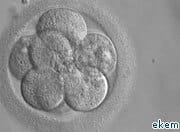A blood test that could allow genetic abnormalities to be detected early on in pregnancy has been met with caution over concerns it could lead to more abortions.
The technique allows an unborn child’s entire genetic code to be “mapped” by examining the mother’s blood.
Peter Saunders, Chief Executive of the Christian Medical Fellowship, warned that the new technique could eventually be used to abort “individual babies with special needs”.
Certain
Mr Saunders cautioned: “In a society that is obsessed with physical perfection this undoubtedly will start with common conditions like Down Syndrome and gradually lead to pressure for the technique to become available for progressively rarer and more minor conditions.”
In a letter to The Times newspaper on Friday Dr Andrew D. Lawson, a Medical Ethicist and Consultant in Pain Medicine, cautioned that the test would lead to more abortions.
He said: “That the blood test will lead to more abortions is certain: why else would one seek to test for cystic fibrosis or sickle cell anaemia early on in pregnancy?”
Concerns
The researchers behind the new test noted that it “raises a number of ethical, legal and social issues that require active discussion among clinicians, scientists, ethicists and the community”.
Dr Christine Patch, Chair of the British Society for Human Genetics, said there were “many concerns”. There have also been concerns raised that the test could lead to a ‘designer baby’ mindset.
The test, which was developed by Dr Dennis Lo of the Chinese University of Hong Kong, has been reported in the Science Translational Medicine journal.
Illness
A research team led by Dr Lo took a sample of blood from a woman who was twelve weeks pregnant, as she wished to know if her child was carrying a life-threatening blood disorder.
Having already mapped the DNA of the mother and father, the researchers were able to separate out the baby’s DNA from the mother’s blood.
Their findings revealed that the child would carry the illness, but not suffer from it.
Dr Lo’s project, which analysed the DNA of one couple and their unborn child, took six months and cost around £127,000.
Eugenic
Researchers want the test to provide an alternative to current invasive tests which increase the chance of the mother suffering a miscarriage.
Mr Saunders said: “Any society will ultimately be judged on how it treats its weakest members and the Christian ethic is that the strong should make sacrifices for the weak, not that the weak should be sacrificed by the strong.
“Precious health resources, rather than being spent on refining eugenic techniques, should go on seeking treatments for those affected by genetic conditions and providing care and support for affected families.”

